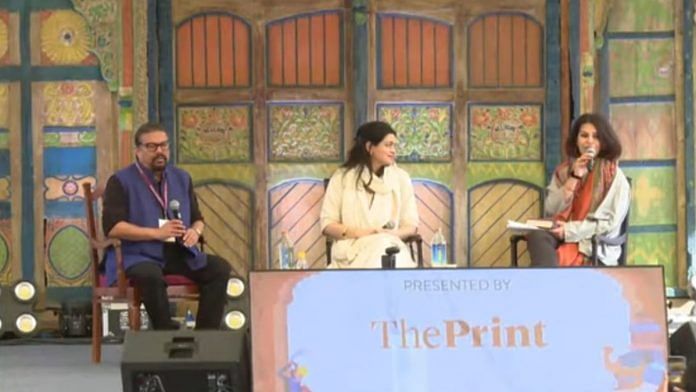Jaipur: What is the art of editing? How do writers and editors complement each other? And who grooms the next generation of editors? These were among questions that came up for discussion during ‘Editorially Speaking’ — a freewheeling chat on the nuances of editing, presented by ThePrint, at the 17th edition of the Jaipur Literature Festival (JLF).
Opening the discussion, journalist and author Vir Sanghvi told the audience: “The job of any editor, as far as a writer is concerned, is to make the work better.”
“It’s the job of an editor to be invisible to the process, invisible to the book. I always think of it, imagine there is a fashion designer and a darzi (tailor). The author is the fashion designer and the editor is the darzi and it should always stay that way because the whole point of great editing is not to impose yourself onto the vision of the author,” said Meru Gokhale, former publisher of Penguin Random House India.
Gokhale, who has edited the works of authors like Salman Rushdie, Jhumpa Lahiri, Paulo Coelho and Arundhati Roy, among others, underscored that respect and honesty are the two threads that define the ties between an editor and an author. There is “no school” for editors, she said, adding that apprenticeship is a key part of the process of becoming an editor.
Journalist Mandira Nayar, the session’s moderator, cited how former New Yorker editor Robert Gottlieb, before he started editing the memoirs of Bill Clinton, told him that in this case, the former US president was working for him and not the other way around.
On her approach, Gokhale said the various elements that characterise the relationship between an author and an editor must come into play “organically”. Sanghvi concurred and added that it is not necessary for an author and an editor to be friends for the process to run smoothly.
He then went on to recall his early years as a journalist in India when the editor had very little to do with those who put together the next day’s paper. “It was a very different world,” he said.
Gokhale added that as a young editor she had to learn to deal with “older men” who never took her work seriously. “Over time, when you have done a few people’s books and people tell other people that you’re a very good editor, then they themselves come up to you and ask for it,” she said.
How editing differs in India, UK & US
Gokhale explained that there are broadly three types of editing: developmental editing, copy editing and proofreading.
“Editors in different countries do this differently. American editing is famously heavy-handed…they love long opening sentences,” she said.
Adding, “British editors are a little bit different. They are a little more relaxed I would say, more curious and less worshipful… They can put in some humour, see the lighter side of things and sometimes see things an American editor won’t, which is not to say one is better or one is worse, they’re just different. And an Indian editor I would say is a mix of the two so there are some who will do that very detailed line-work and be obsessed by that and there are others who are more conceptual.”
Sanghvi said he was of the opinion that “American editing is much more thorough than editing anywhere in the world”.
“The Americans will want everything exact; the disadvantage with that is, as Meru suggested, often the prose is so bloody boring and so deadly earnest because they take every stylistic kink that you have and they edit it out,” he said.
Towards the end of the discussion, Gokhale spoke about her latest venture, Editrix, an AI-powered editing app that she believes can help editors hone their skills and groom the next generation of editors.
ThePrint is a digital media partner for Jaipur Literature Festival 2024
(Edited by Zinnia Ray Chaudhuri)



